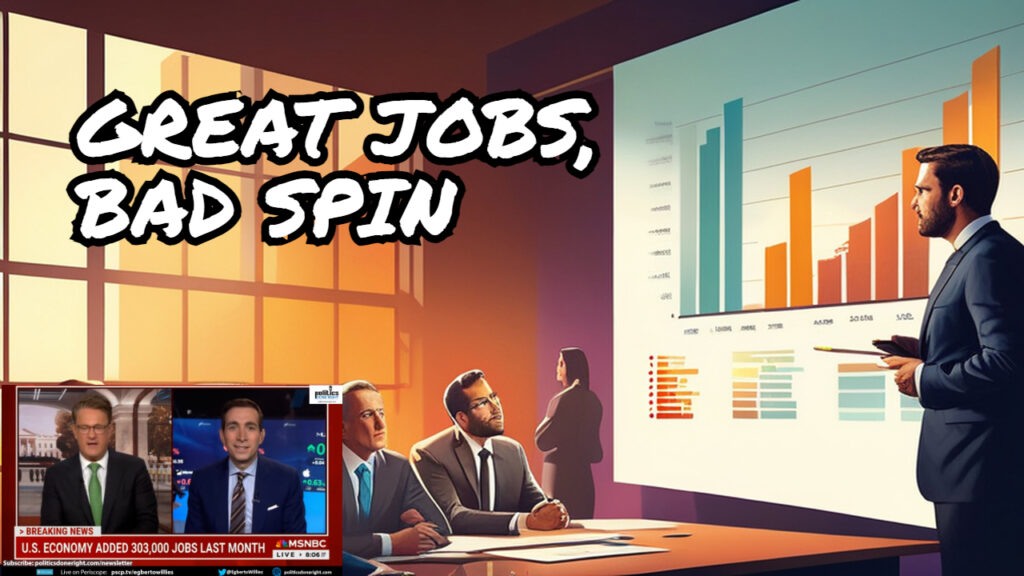The jobs report is excellent, and we must not allow it to be tarnished. The Right would have you believe that good is bad, up is down for their electoral purposes.
GREAT JOBS REPORT!
Podcasts (Video — Audio)
In today’s society, where the media’s portrayal of economic indicators often dictates public sentiment and policy discourse, the recent jobs report perfectly illustrates this phenomenon. The report, boasting an impressive addition of 303,000 jobs last month, initially sparked enthusiasm and acclaim for indicating a robust economy. However, this narrative quickly shifted towards skepticism and concern, underpinning the paradoxical nature of economic success in contemporary discourse. Here are the underlying reasons for this phenomenon, challenging the prevailing economic paradigms and advocating for a reassessment of our collective understanding of prosperity and its distribution.
The perplexing reaction to economic success stories is at the heart of this discussion. The transformation of a positive jobs report into a harbinger of potential economic overheating and inflationary pressures exemplifies a systemic bias against middle-class prosperity. This bias is not coincidental but deeply entrenched in capitalist economies’ operational frameworks. It reflects a fundamental contradiction: while a strong labor market benefits the workforce through higher employment and wages, it instills fears among the economic elite and policymakers about inflation and interest rate hikes.
The criticism of robust job growth stems from a neoliberal economic doctrine prioritizing inflation control over full employment and equitable wealth distribution. This doctrine posits that a tight labor market, by empowering workers to demand higher wages, could lead to inflationary spirals. However, this perspective blatantly ignores the substantial benefits of a strong labor market, including reduced income inequality and enhanced social stability. It also overlooks the capacity of modern economies to absorb and adapt to these changes without necessarily spiraling into inflation.
Moreover, the negative spin on positive job reports reveals a deeper malaise: a deliberate orchestration by economic elites to maintain a status quo that disproportionately favors capital over labor. They justify policies that undermine worker rights and income growth by framing economic success as potential risks rather than tangible benefits. This narrative perpetuates a cycle of wealth concentration at the top while the middle class and poor are left to navigate a precarious economic landscape marred by job insecurity and stagnant wages.
The manipulation of economic narratives to serve elite interests underscores the need to reevaluate our economic priorities and policies critically. It calls for a progressive economic agenda that champions the rights and welfare of the broader workforce over the inflation paranoia that has long dominated policy-making circles. Such an agenda would prioritize sustainable wage growth, equitable wealth distribution, and robust social safety nets over the unfounded fears of inflation that have been used to justify austerity and wage suppression.
I want to be clear. Most of the inflation is demonstrably caused by corporate greed and corporate ineptitude. One need only study the direct correlation of recent corporate profits with inflation. In fact, Congresswoman Katie Porter took that truth to the halls of Congress and should have gotten much more coverage. In today’s economy, we must call the inflation rate what it is: CGR, aka Corporate Greed Rate.
The Fed’s use of interest rates to bring down inflation, aka the Corporate Greed Rate, is a tax and penalty on the poor and middle class. Given that corporate greed and ineptitude demonstrably create inflation, they should bear the cost of any economic disruption. Yes, it is a paradigm shift, but a just one. If they insist on raising prices, their excess profits, the legal theft of our income, should be taxed away at 90%+ and redistributed back to the masses progressively. This only sounds punitive because of our indoctrination from birth in which we protect the business class at all costs under the false premise that they are the job creators.
The reaction to the recent jobs report is a stark reminder of the ideological biases that shape our economic discourse and policy. It highlights the urgent need for a progressive reimagining of economic success, which values all citizens’ well-being and prosperity over the economic elite’s narrow interests. Only through such a paradigm shift can we hope to address the systemic inequalities and injustices that plague our economic system, paving the way for a more equitable and just society.
Viewers are encouraged to subscribe and join the conversation for more insightful commentary and to support progressive messages. Together, we can populate the internet with progressive messages that represent the true aspirations of most Americans.

